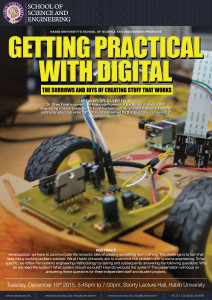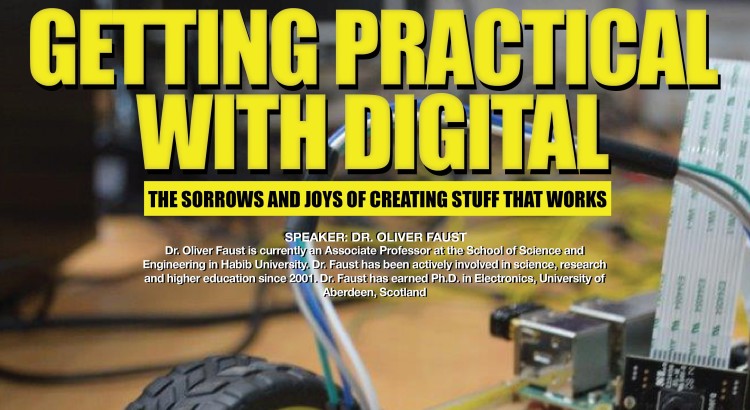By Anusha Aijaz
(Student, School of Arts, Humanities and Social Sciences, Habib University)
Dr. Oliver Faust has been engaged in science, research and higher education since 2001. He has served in numerous academic and private institutes. By contributing innovative solutions to physical problems in science, he improved the academic standards of the institutes. Most recently, he became part of Habib University after spending four years at Ngee Ann Polytechnic in Singapore.
Dr. Faust gave a talk which addressed the challenge of a working problem solution. He initiated his talk by framing the problem of SSE faculty of Habib University : How to teach, design and implement modern electronic systems? Then he elaborated that generally the students do not have adequate will to carry through modern electronic projects. They do not possess sufficient knowledge about it. Students struggle hard due to unsatisfactory supervision, and end up having unclear goals and weakly defined outcomes. The lack of ample funding to achieve key components is also part of the problem.
https://vimeo.com/153332414
Oliver then talked about Habib University‘s approach in resolving these problems. He said, “Fundamental to doing a good job in teaching electronic design is proper planning, and an understanding of systems engineering.” He answered each of the questions that he had laid out in the beginning of the talk. He explained that problems can be sorted out by understanding the requirement of the project, which helps in creating the will to do it. Moreover, he mentioned the importance of structuring the tasks to support the learning that is necessary to complete the given project. In addition, he spoke about the value of planning supervisory roles to assure the proper guidance for students. He demonstrated that, while on one hand a good understanding of system engineering provides clear goals, on the other hand design methodology implemented to a project facilitates the clarification of these goals, and sets the limitations of budget as the project proceeds.
On the basis of these principles, the Habib University faculty undertook various projects with their students. It included a digital to analogue converter circuit, BlueSteps (a Bluetooth-based stepper motor control system), and a mobile robot. Dr. Faust broke each project down into the challenges facing students at their outset and how they responded to them. He explained how the project was first understood, delineated its requirements. Then he spoke about how students would go about resolving the requirements outlined, and finally how their creations implemented and tested.
Dr. Oliver made various interesting observations on the basis of the faculty’s experience with these projects. He described that it is possible to work on projects with international influences in a highly restricted environment, but only if you have a strong understanding of system engineering. It is also important to be creative with different resources to achieve your aims. Giving an example of when he was supervising the mobile robot project, his team observed that flying robots can crash and get damaged, leading to budgetary troubles. They worked around this challenge by recreating the project with a robot that had wheels.
The talk offered interesting insights into Habib University’s School of Science & Engineering, and has important lessons for teachers wanting to introduce similar projects in other universities.

